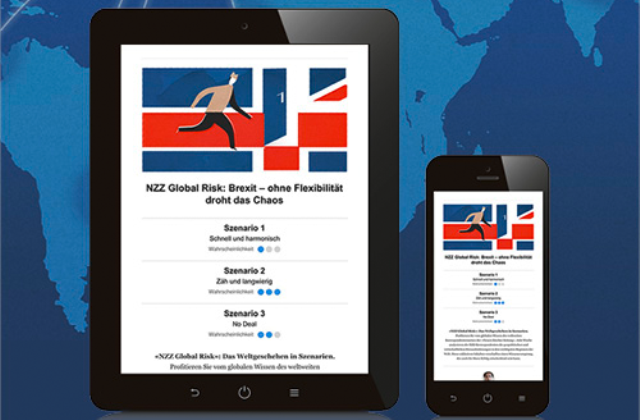NZZ Global Risk: World events in scenarios
On 1 June, the NZZ launches the "NZZ Global Risk" newsletter, a product for Swiss SME entrepreneurs. This service is designed to help them correctly assess the impact of political developments on their business.

A new premium newsletter entitled "NZZ Global Risk" is designed to give SMEs a knowledge edge in politically turbulent times that can be crucial to success. This is because most SMEs do not have the resources to systematically deal with geopolitical risks and take them into account in their decisions. This is where "NZZ Global Risk" comes in, as NZZ Editor-in-Chief Eric Gujer explains in the following interview:
On 1 June, the premium newsletter "NZZ Global Risk" will be published for the first time. What is this new product about?
Eric Gujer: Brexit and the election of Donald Trump have shown how directly political events affect the economy and businesses. This is increasing. There is hardly an SME left in Switzerland that is not active internationally in some way. However, these companies cannot afford research departments like large corporations do. This is where we can offer something, because assessing political and geopolitical risks is our speciality. A second strength is our independence. And finally, we are also a Swiss SME and have a Swiss perspective on the world.
Who are the recipients of your newsletter? Who do you want to reach specifically?
NZZ Global Risk is aimed at SME entrepreneurs and interested readers. We start as a premium newsletter included in the NZZ subscriber. There are many entrepreneurs among NZZ readers. Non-subscribers can buy a digital trial subscription for CHF 20 and thus test NZZ Global Risk. In exchange with our readers, we will further develop the product after the launch and offer NZZ Global Risk in a second phase as an independent, fee-based product.
Does "NZZ Global Risk" exist only as a newsletter or also in another form?
After the first phase, we will expand the product based on the feedback and behavior of our readers. It is quite conceivable that there will also be a printed version one day. What is already clear is that we will be holding a conference once a year on the opportunities and risks of a particular country region. The first one will take place on August 24 in Zurich on the topic of China. At this conference, our foreign correspondents will examine the topic from the perspective of their respective locations. In August, not only our China correspondent will speak, but also the one from the USA, who of course has a very interesting perspective in this context.
There are already various services for internationally active SMEs, such as those offered by Switzerland Global Enterprise S-GE or the Swiss Export Association. To what extent do you differentiate yourself with your offer?
We do not promote exports and are not a state organisation that has to take foreign policy into account. We are also not a company with our own products and interests in these markets. Our product is independent and impartial. These have always been the strengths of the NZZ.

How is "NZZ Global Risk" financed?
In the first phase it is an offer for our subscribers, financed by subscription income.
So no funding from advertising?
No. A partnership is a possibility.
What sources do you rely on for the content conveyed? Is this purely journalistically researched information or do you also rely on contributions from third parties? If so, on whom?
The NZZ has a network of over 50 correspondents worldwide that is unique in Europe. These are experts who have been working in the respective countries and regions for years. It has long been the case that business delegations abroad like to meet with the local NZZ correspondents because they are not only very well informed and networked, but also independent. For NZZ Global Risk, we work solely with RepRisk. They specialize in the evaluation and graphic presentation of global reputational risks.
How is the newsletter structured?
The Premium Newsletter first presents a management summary, then delves into three plausible scenarios, compares them and assesses their likelihood of occurrence. At the end, we draw a conclusion tailored to the needs of SME entrepreneurs and also provide the reader with extensive statistical and graphical material on the topic. The first newsletter is about the rise of China and the end of the American-dominated world order. The three scenarios we see: 1) confrontation and trade war, 2) harmonious alliance or 3) pragmatism despite mistrust.
These are indeed geopolitical movements that are at best relevant at the strategic level. Aren't you moving too far away from the daily business of SMEs?
SMEs know their daily business best. But geopolitical changes are by no means far removed from daily business. Increasingly, they have a very direct impact on businesses and entrepreneurs need to take them into account when making decisions. The devaluation of the British pound after the Brexit vote, for example, had a very tangible impact on business with England.
Always on Thursdays
"NZZ Global Risk" is published every Thursday, for the first time on 1 June. In a first phase, the premium newsletter is included in the NZZ subscription and can be ordered at www.nzz.ch/globalrisk be subscribed to. The contents of "NZZ Global Risk" are exclusive - i.e. they do not appear elsewhere. In addition to the weekly newsletter, there will be an event once a year on the opportunities and risks of a specific country region. The first conference will take place on 24 August 2017 in Zurich.
Further information incl. video teaser
(This interview was published on June 1 on the online portal of the organizer.ch - a title published by galledia verlag ag).









